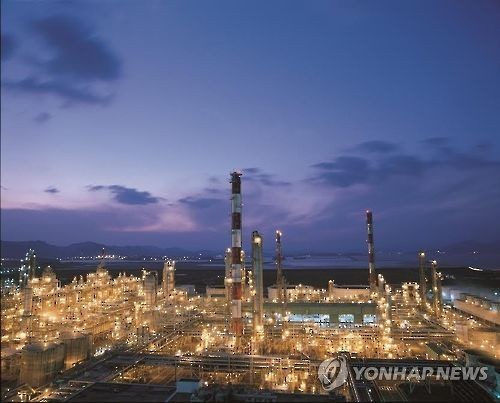Petroleum and petrochemical products emerged as the biggest export item for South Korea last month as Chinese and Japanese refiners are reducing exports due to growing domestic consumption, government data showed Friday.
Exports of petroleum reached $2.92 billion and petrochemical goods $3.81 billion in February, according to the data. The combined figure of $6.7 billion is well over $6.4 billion worth of semiconductors shipped out during the same period.
 |
(Yonhap) |
The rise in oil and petrochemical goods shipments is partly attributed to China reducing export quotas of such products by 40 percent this year from a year earlier due to growing domestic consumption, industry sources said. Several major Japanese refiners are undergoing regular renovations that have affected output.
"Domestic refiners are expected to post handsome earnings for the first quarter of this year helped by stable international oil prices and other favorable market conditions," a source said.
South Korea's four major oil refiners -- SK Innovation Co., GS Caltex Corp., S-Oil Corp. and Hyundai Oilbank Co. -- logged a combined operating income of 8.03 trillion won ($6.96 billion) last year, an all-time high figure, due to improved cracking margins, inventory gains and solid demand for petrochemical products.
Saudi Arabia's state-run oil firm Aramco recently announced plans to reduce the prices of crude oil for delivery for April and thereafter amid China reducing oil imports from the Middle East.
"South Korean refiners will benefit from the price cut by Aramco as they are importing directly from Aramco and other Middle Eastern refiners in large quantities," an industry source said.
"Other Middle Eastern refiners tend to lower prices when Aramco
makes cuts."
The benchmark Singapore complex gross refining margin fell to $6.6 for the first quarter of this year from $6.7 the previous quarter. Singapore is the regional trading hub of the benchmark Dubai crude.
The margin is the difference between the total value of petroleum products from oil refineries, and the cost of crude and related services, including transportation. (Yonhap)






![[Herald Interview] 'Trump will use tariffs as first line of defense for American manufacturing'](http://res.heraldm.com/phpwas/restmb_idxmake.php?idx=644&simg=/content/image/2024/11/26/20241126050017_0.jpg)
![[Exclusive] Hyundai Mobis eyes closer ties with BYD](http://res.heraldm.com/phpwas/restmb_idxmake.php?idx=644&simg=/content/image/2024/11/25/20241125050044_0.jpg)
